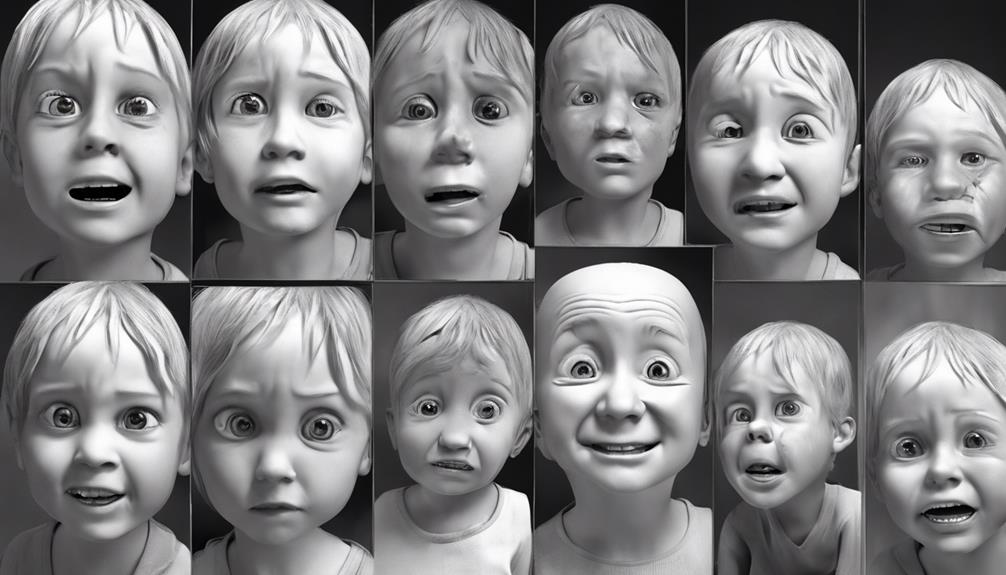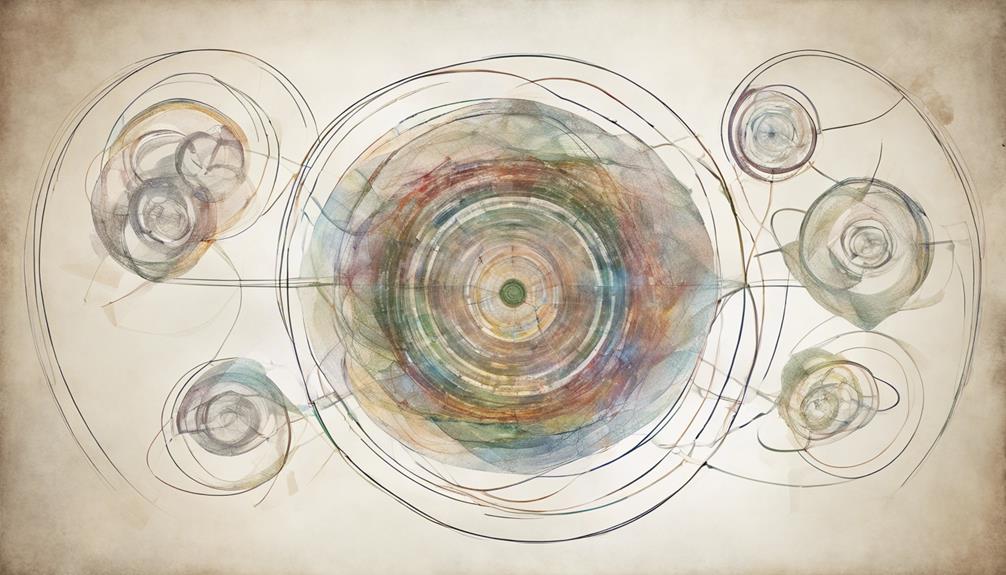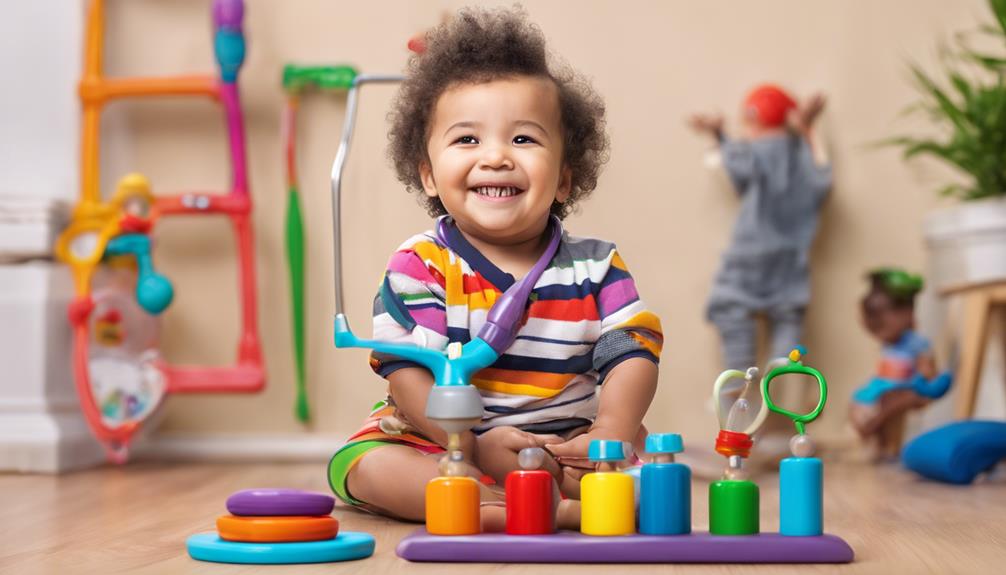Let's delve into the intricate tapestry of human development, where each domain intricately weaves into the fabric of who we become. Physical development sets the foundation for our movements and abilities, like pieces of a puzzle falling into place.
But what about the other domains that shape our minds and emotions? Join us as we unravel the threads of cognitive, emotional, social, and moral development, each adding a unique hue to the portrait of human growth.
Key Takeaways
- Physical development involves sensory integration and motor skills crucial for growth.
- Cognitive development focuses on mental growth and reasoning abilities for understanding.
- Emotional development centers on managing emotions and forming relationships for personal well-being.
- Social development involves acquiring skills for effective interactions and understanding societal norms.
Physical Development
In the domain of human development, physical development encompasses the intricate progression of sensory integration, gross motor skills, and fine motor skills. As children grow, they reach important milestones such as sitting, walking, and running, which highlight their physical growth. Proprioception plays a vital role in physical development, as it involves the awareness of one's own body position in space. This awareness allows children to navigate their environment effectively and develop coordination.
Sensory integration is another key aspect of physical development, as children instinctively respond to stimuli in their sensory environment to support their growth. Whether it's feeling different textures, hearing sounds, or experiencing different temperatures, these sensory inputs help children understand the world around them and refine their motor skills.
Moreover, gross motor skills involve larger muscle groups and are essential for activities like crawling, walking, and jumping. On the other hand, fine motor skills involve smaller muscle groups and are essential for tasks such as grasping objects and writing. Both types of motor skills are interconnected and play a significant role in a child's physical development.
Cognitive Development

Exploring the intricate domain of cognitive development reveals the fundamental processes behind mental growth, reasoning abilities, and understanding in individuals. Jean Piaget's stages of cognitive development, including sensorimotor, preoperational, concrete operational, and formal operational stages, provide a framework for understanding how mental processing evolves from infancy to adulthood. Cognitive development isn't only about problem-solving and critical thinking but also how individuals interact with their environment to learn new information.
During cognitive development, individuals enhance their reasoning skills, which are important for decision-making and processing information effectively. As cognitive abilities progress, individuals become better equipped to tackle complex tasks and challenges. Engaging in activities that stimulate cognitive functions, such as puzzles, games, and critical thinking exercises, can greatly contribute to overall cognitive growth.
Emotional Development

Emotional development encompasses the intricate process of understanding and managing one's own emotions, fostering empathy, and cultivating healthy relationships. It plays a crucial role in shaping our social interactions, personal well-being, and overall mental health. Through emotional development, individuals learn to regulate their emotions, express themselves effectively, and form resilient relationships. Positive emotional development is linked to increased levels of empathy, which enables individuals to understand and connect with others on a deeper level. This, in turn, fosters the creation of meaningful and healthy relationships that contribute to one's emotional resilience and personal well-being.
| Aspects of Emotional Development | Examples |
|---|---|
| Understanding own emotions | Recognizing when feeling sad or happy |
| Fostering empathy | Showing compassion towards a friend in need |
| Regulating emotions | Taking deep breaths when feeling angry |
| Forming relationships | Building friendships based on trust and respect |
| Expressing emotions | Articulating feelings through words or art |
Social Development

Social development entails the acquisition of skills and behaviors that enable individuals to engage effectively in social interactions and navigate societal norms and expectations. When exploring social development, we investigate the intricate web of relationships, emotions, social skills, and empathy that shape our interactions with others. Here are four key aspects to ponder:
- Understanding Social Norms: Children learn the unspoken rules of society through social development, understanding what behaviors are acceptable and expected in different social contexts.
- Developing Communication Skills: Effective communication is fundamental to social development, as it allows individuals to express themselves clearly, listen actively, and connect with others on a deeper level.
- Building Positive Relationships: Fostering positive relationships is an essential outcome of social development, as it cultivates trust, support, and a sense of belonging within social circles.
- Managing Conflicts: Conflict resolution is an important skill acquired through social development, enabling individuals to navigate disagreements peacefully and maintain harmonious relationships with others.
Moral Development

Moral development encompasses the progressive understanding and internalization of ethical values and principles guiding decision-making processes. This development is heavily influenced by social interactions, cultural norms, and personal experiences.
Kohlberg's stages of moral development provide a framework for understanding the evolution from basic obedience to the internalization of principled behavior. Values, beliefs, and ethical decision-making all play significant roles in shaping an individual's moral compass.
Encouraging traits such as empathy, fairness, and cooperation can foster the growth of moral development, particularly in children. Through exposure to diverse perspectives and opportunities to practice moral reasoning, individuals can enhance their ability to navigate complex ethical dilemmas.
Frequently Asked Questions
What Are the 5 Domains of Development?
We explore the 5 domains of development: physical, cognitive, social-emotional, language, and adaptive. Each domain contributes uniquely to our growth and understanding. Physical development involves growth and motor skills. Cognitive development encompasses thinking abilities. Social-emotional development focuses on emotional regulation. Language development enhances communication skills.
What Are the 5 Domains of Psychology and What Does Each Domain Deal With?
We explore cognitive, developmental, behavioral, social, and clinical psychology. Each domain investigates distinct aspects of human behavior and mental processes. Cognitive psychology examines memory and decision-making. Developmental psychology studies growth across the lifespan. Behavioral psychology analyzes learned behaviors. Social psychology investigates social influences.
What Are the Domains of Human Development?
We explore the interconnected domains of human development, encompassing physical, cognitive, social-emotional, language, and adaptive aspects. Each domain contributes uniquely to a person's growth and well-being, emphasizing the holistic nature of development.
What Are the 5 Main Areas of Child Development?
We explore the 5 main areas of child development: physical, cognitive, language, social-emotional, and adaptive. Each domain plays an important role in shaping individuals. Growth, learning, communication, emotions, and daily living skills all contribute to our holistic development.
Conclusion
To sum up, the five aspects of human development – physical, cognitive, emotional, social, and moral – are interconnected and essential for a person's overall well-being. Like the intricate branches of a tree, each domain contributes to the growth and resilience of the individual.
Just as leaves rely on the sturdy trunk for support, our development thrives when all aspects are nurtured and flourishing. Together, they form a strong foundation for a healthy and fulfilling life.








